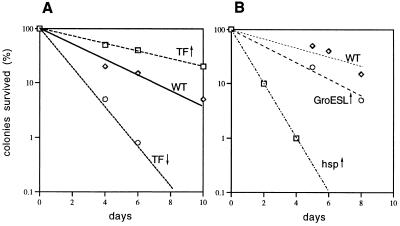Figure 3.
Effects of increasing or decreasing expression of TF (A) and hsp generally or GroEL/ES (B) on cell viability at 4°C. (A) TF-overproducing strain was grown until mid-log phase at 37°C in LB medium supplemented with arabinose which increased TF content from 3- to 10-fold (depending on the experiment). The TF-deficient cells were grown in the presence of glucose which reduced TF content 10-fold, as described (3, 10). In each case, wild-type controls were grown under similar conditions. The cultures were diluted with LB medium, and equal amounts of cells from each were plated on the Petri dishes containing arabinose or glucose, respectively. The plates were stored at 4°C, and after different times, the number of colonies that survived were measured by transferring the plates to 37°C. Very similar results were obtained when the liquid cultures were stored at 4°C, at different times plated on the Petri dishes, and the colonies that grew at 37°C were counted. (B) To increase cellular content of heat-shock proteins, wild-type cells carrying pUHE211–1 plasmid containing hsp-specific subunit of RNA polymerase, σ32, under the control of lac promoter (kindly provided by B. Bukau, University of Heidelberg), were grown to mid-log phase in LB at 37°C. Then the culture was divided into two parts. Isopropyl β-d-thiogalactoside (IPTG; 1 mM) was added to one of them, and both cultures were incubated for 0.25–1 hr at 37°C which resulted in a 3- to 10-fold increase in hsp content (depending on the experiment). To study the effects of overproducing GroEL/ES, similar experiments were carried out with cells carrying the groES/EL operon on a plasmid (pDK84, kindly provided by M. Snavely, Amgen Biologicals) under the control of the lac promoter. The effect of hsp overproduction on cold survival was studied as described in A.

